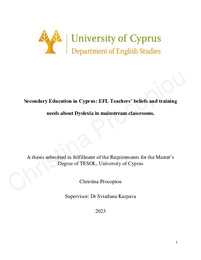Secondary Education in Cyprus: EFL Teachers’ beliefs and training needs about Dyslexia in mainstream classrooms.

View/
Date
2023-10Author
Procopiou, ChristinaPublisher
Πανεπιστήμιο Κύπρου, Σχολή Ανθρωπιστικών Επιστημών / University of Cyprus, Faculty of HumanitiesPlace of publication
CyprusGoogle Scholar check
Keyword(s):
Metadata
Show full item recordAbstract
This study aimed to explore EFL teachers’ beliefs and attitudes regarding teaching English to dyslexic learners in mainstream classrooms in Cyprus. The study focused on the secondary education of both the public and private sector. I also analysed the level of teachers’ knowledge and awareness about dyslexia and the practices they follow during the lesson to facilitate the learning process by dyslexic learners. It also dealt with the training needs of EFL teachers in Cyprus. This thesis shed light on a general picture of how dyslexic learners are encountered in public and private schools. Additionally, it aimed to clarify whether the Ministry's standards restrict the involvement of dyslexic students in mainstream classroom settings and whether the private sector appears more equipped than the public sector.
The research design of the study had two stages. The first stage was the collection of the questionnaire data, which was distributed among EFL teachers; 66 teachers filled in the questionnaire. Thirty- four of them work in public gymnasiums or lyceums and 32 work in the private sector. The statistical analysis of the data showed that EFL teachers believed that for the better learning experience of dyslexic learners in mainstream classrooms, it is important to have collaboration with a group of professionals. Collaboration with dyslexic students’ parents was also considered important. The level of education affected the way teachers perceived online teaching. EFL teachers with an MA believed more strongly than teachers with a BA that dyslexic learners were more comfortable in an online teaching environment rather than face-to-face. They were also more in line with the statement that these students’ anxiety levels were lower when taught online. Another important factor that played a role is the teachers age and years of teaching experience. The older the teachers were, the stronger belief they had that dyslexic learners were struggling in online lessons. Also, there was a difference between the private and public sphere regarding how supportive the system they work in is towards dyslexic learners. In general, all participants believed that they need more training on the topic.
For the second part of the analysis, I conducted an interview with a small sample of participants who volunteered to be interviewed. I interviewed 18 EFL teachers (9 teachers of public sector and 9 of the private sector). Through qualitative analysis it was concluded that all teachers need and would like to have further training regarding inclusive practices for dyslexic learners. Institute owners that took part in the study seemed to offer training opportunities to their employees, something that does not happen in the public sector. Also, the public sector has some issues that make inclusive teaching difficult. For example, the curriculum needs to be modified and updated while taking into consideration dyslexic learners.
Collections
Cite as
The following license files are associated with this item:

